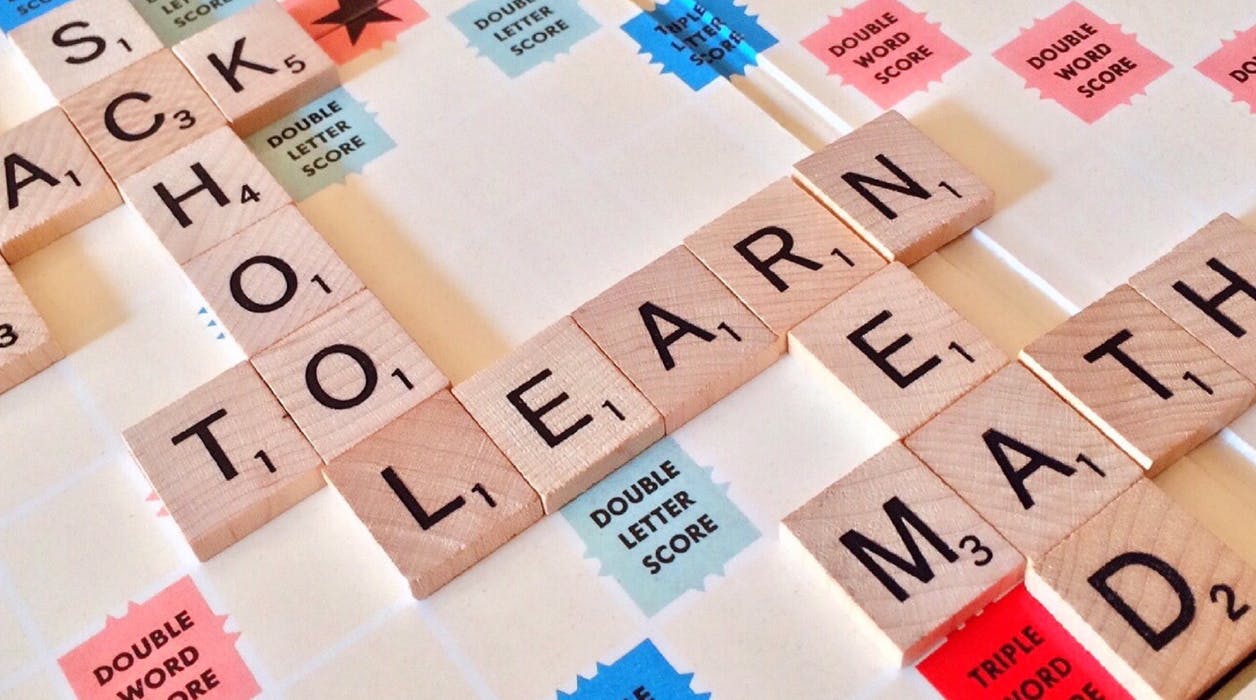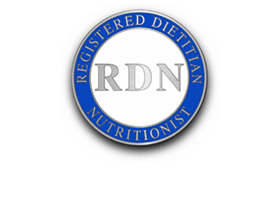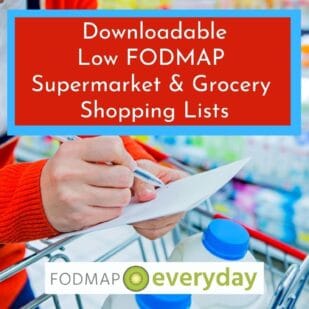Learn The Important Differences Between Dietitians & Nutritionists
What are the differences between a dietitian and a nutritionist? This is a common question and so often these titles are used interchangeably. It is important to understand the difference especially when selecting a FODMAP expert to seek professional advice and assistance navigating the low FODMAP diet.

A dietitian is also referred to as a Registered Dietitian (RD), but can also be known internationally as a Registered Dietitian Nutritionist (RDN), and Accredited Practising Dietitian (APD), however, in this article I will use the acronym RD for ease.
Nutritionists are not required to complete any formal education, supervised training, or work experience before practicing nutrition. Nutritionists in the United States, Canada, Australia, and the United Kingdom are not regulated nor legally bound to any governing body ensuring that the education provided is safe and evidence based.
Know Who You Are Hiring
In recent years the numbers of nutritionists, health coaches, nutrition coaches, functional nutritionist, nutrition therapists, gut health specialists, and other nutrition experts have exploded, especially in the world of social media and blogs. Search the word IBS or FODMAP and you will find an array of IBS experts, including some qualified low FODMAP trained RDs, MDs, GIs, functional gut doctors, naturopaths, IBS sufferers who want to coach others on the low FODMAP diet, and much more.
Unfortunately, much of the nutrition advice online around gut health is inaccurate, not science based and often includes an overly restrictive diet plan to cure IBS, SIBO, leaky gut, or inflammatory bowel disease (IBD) to name a few approaches and other diagnoses.
The Monash University developed the Low FODMAP Diet for IBS Online Training Course for Health Professionals, specifically for dietitians. Monash highly recommends working with a FODMAP trained RD before embarking on the low FODMAP diet. This is also our recommendation here at FODMAP Everyday®.
Why Work with a RD?
Education
A RD has a minimum of a Bachelor Degrees in dietetics, nutrition science, or another nutrition related field in the United States, Canada, Australia, UK and other countries. University coursework includes many nutrition sciences classes, sociology, anatomy, physiology, biochemical nutrition, food science, microbiology, math, and chemistry.
After earning a B.S. degree a RD must complete a 6 to 12 month supervised training also called an internship from an accredited, supervised program and/or a coordinated Master degree program with clinical rotations in various healthcare settings, food service, research, community nutrition, public health, and more. Once completed both the academic coursework and the supervised program one must pass the challenging registration exam before earning the RD credential.

Strict criteria must be met before one can become a registered dietitian under their governing bodies based on location. Dietetic professional associations are found around the globe protecting the dietitian title.
- The Commission on Dietetic Registrations (CDR) in the USA. There is Certified Nutrition Specialist (CNS) title, which allows one with an advanced degree and adequate work experience take the RD certification exam. (1)
- The Health and Care Professions Council registers dietitians to work for the National Health System (NHS) in the UK. (2)
- The Dietitians Association of Australia (DAA) provides the qualifications to become an Accredited Practicing Dietitian (APD) in Australia (3)
- The Canadian Dietetic Registration Examination(CDRE) in Canada. Each province has an independent professional college, which is responsible for the protection and regulation of dietitians. (4)
- Health Professions Council of South Africa in South Africa. (5)
A RD needs to remain up to date with approved continuing education hours to maintain the RD credentials, advance their knowledge and skill set, and remain current in nutrition science. An RD’s academic and supervised training sets them apart from other “nutritionists”.
Insurance Coverage or Rebates
An important benefit of working with a RD is they can bill insurance for medical nutrition therapy, which may encompass IBS and the low FODMAP diet education, however, this varies based on insurance benefits, providers, diagnoses, and country. Often a nutrition referral needs to be placed by a MD or GI in order to check nutrition benefits and request authorization.
Several countries cover nutrition visits with a RD, however, the number of visits is often limited and wait times can cause delays in treatment. In Australia an APD is the only credential recognized by Medicare, the Department of Veterans’ Affairs and private health insurances where patients can use rebates to reduce the cost of a nutrition visit if identified in a care plan coordinated by a general practitioner. (3)
In the US a RD may choose to not accept insurance but can provide a super bill to submit to your insurance company to obtain reimbursement for the cost of the nutrition visit.
Ethics and Legality

A RD is the only nutrition expert regulated by the law and the title Dietitian is legally protected, which means only a clinician who is registered and qualified can be called a dietitian. RDs must follow licensing rules, which can restrict their ability to provide medical nutrition therapy outside of their home state,province, territory, or country.
RDs must practice within their scope of practice and maintain the ethics of their professional responsibility to provide safe and evidenced based nutrition recommendations.
Here are two specific examples from the American Dietetic Association Commission on Dietetic Registration Code of Ethics for the Profession of Dietetics and Process for Consideration of Ethics Issues (Journal of the American Dietetic Association, August 2009, pg. 1467), which all RDs must abide by:
- “Practice using an evidence-based approach within areas of competence, continuously develop and enhance expertise, and recognize limitations ” (6)
- “ Make evidence-based practice decisions, taking into account the unique values and circumstances of the patient/client and community, in combination with the practitioner’s expertise and judgment” (6)
You will not likely find a RD selling a supplement or a quick fix diet to heal your IBS or SIBO.
The reality is that I spend too much time during my nutrition visits debunking inaccurate nutrition claims and rationalizing why some diet approaches are not appropriate. Unfortunately, personal bias sets the tone for much of the nutrition information online. Just because a certain diet works for one does not mean it will work for you or is safe for that matter.
Specialized & Advanced Training
Many RDs have certifications or advanced training in specialized fields, such as pediatrics, diabetes, renal, oncology, sports nutrition, nutrition support, weight management, food allergies, and gastrointestinal disorders.
It is highly encouraged to work with a RD specializing in the low FODMAP diet to ensure they are well versed in this diet. If you have a child with IBS please seek help from a pediatric RD, preferably one with FODMAP training.
A Personalized Approach
A cookie cut meal plan or canned nutrition protocol does not work for the majority of people. A RD can perform a thorough nutrition assessment and devise a nutrition care plan to help reduce your IBS symptoms. As an example, the strict low FODMAP diet may not be the best option for every person.
Nutrition therapy is not a one size fits all approach; a RD can tailor their education to meet your individual needs while taking into account your personal health, lifestyle, financial situation, and more.

Well Trained to Manage All Gastrointestinal (GI) Related Disorders & Chronic Diseases
More often than not my patients present with IBS and another chronic disease. As a RD I am able to help manage other GI disorders such as IBD (inflammatory bowel disease), celiac, food allergies, gastroparesis, and reflux in addition to IBS.
A RD is also well versed in nutrition therapy and counseling for diabetes, heart disease, renal disease, weight issues, and more which need to be taken into consideration before embarking on the low FODMAP diet.
A nutritionist will most likely lack the professional training to provide medical nutrition therapy for GI related disorders and chronic disease states.
A RD is also very comfortable speaking on your behalf and can communicate with your GI or MD providing a team approach to your healthcare. A RD can kindly request your doctor to order nutrition pertinent labs, tests, and share medical chart notes when appropriate. A RD is your best ally in complex situations such as IBS and chronic disease.
A RD Looks at the Big Picture
The low FODMAP diet is challenging and a FODMAP trained RD can help you achieve IBS symptom control quicker and with fewer mistakes. A RD can also ensure you are consuming an adequate and healthy diet, not just low FODMAP. Often times, over-restriction occurs due to poor understanding or the diet or conflicting information.
A FODMAP trained RD can help you navigate the most recent research. RDs often provide up to date handouts and materials to complement the nutrition visit to ensure you have all the resources you need to be successful.
I often provide my patients with a detailed nutrition plan for the elimination diet, sample meal plans, grocery lists, and additional resources to meet their specific dietary needs such as low FODMAP fiber and protein sources if their current dietary habits are lacking.
Follow-up visits will focus on adherence to diet, additional education, troubleshooting and learning how to manage IBS symptoms for the long term.

Lastly, a Dietitian is Science Based
IBS and FODMAP are evolving fields, a RD can help interpret the most up to date research regarding GI nutrition and translate this into realistic, practical recommendations. As an example I will be attending a three day conference FOOD: The Main Course to Digestive Health at the University of Michigan this fall to learn the most cutting edge information about IBS and the low FODMAP diet, IBS and athletes, emerging role of SIBO and the gut microbiome, these conferences are directed towards dietitians.
While there are a few nutritionists well versed in the low FODMAP diet I would encourage you to consider consulting with a RD. Click here to find a FODMAP trained dietitian near you, or one who can provide virtual consults.
Registered Dietitians To The Rescue
The low FODMAP diet is meant to be undertaken along with a Registered Dietitian (RD, or equivalent in your country). The diet is nuanced and complex; statistically and anecdotally you will have a greater chance of success if you work with one.
We have put together a series of articles called Working With A Dietitian to help you learn why you should work with a dietitian, how to find the right dietitian for you, the difference between dietitians and nutritionists, what to expect from working with one, tips for successful telehealth appointments, and more.
Please take the time to familiarize yourself with these articles and resources:
- Have IBS? Top Reasons To Work With A Dietitian
- How To Choose A Dietitian
- IBS: Step-by-Step Guide From Diagnosis To Symptom Free Living
- Patient Dos And Don’ts For A Great Telehealth Appointment
- What If The Low FODMAP Diet Isn’t Working?
- Global Dietitian Directory
Sources:
- Commission of Dietetic Registration. (Accessed: 23 June 2018)
- The British Dietetics Association. (Accessed: 23 June 2018)
- Dietitians Association of Australia. (Accessed: 23 June 2018)
- Dietitians of Canada. (Accessed: 23 June 2018)
- Wikipedia the Free Encyclopedia. (Accessed: 23 June 2018)
- Academy of Nutrition and Dietetics’ Code of Ethics for the profession of dietetics. (Accessed: 23 June 2018)








Fantastic article! A FODMAP trained dietitian can make or break the low FODMAP program, so the information presented here is so important. I started the low FODMAP program under a dietitian who wasn’t specifically trained in the Low FODMAP Diet and it was an absolute mess! Hopefully, this article helps IBS patients find the right resources from the get-go!
Amy, thank you for weighing in. It is SO TRUE! Certainly having a registered dietitian (or equivalent in your country) is a smart start. Now that Monash has FODMAP training it makes a lot of sense to find a dietitian who has that specialized training as well. The diet is so nuanced, and we always suggest working with a pro! I was lucky in that I was working on my book with Kate Scarlata as I was going through Elimination and Challenges and I had her ear. You need someone to bounce questions off of, for sure. So glad that you finally found your way to a healthier life and relationship with FODMAPs!